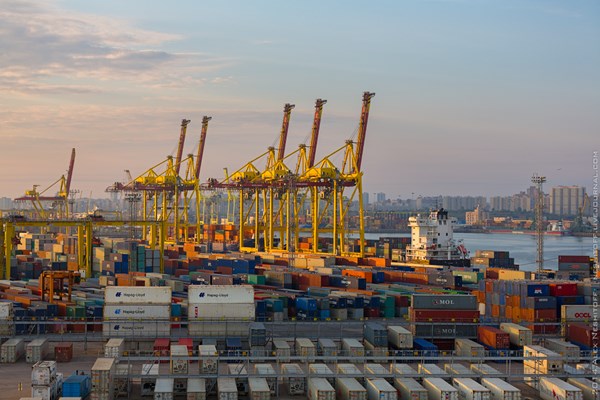St. Petersburg port halts ammonium nitrate transshipment due to Ukrainian drone threat
Fearing attacks by Ukrainian strike drones, the Russian maritime port known as the "Big Port of St. Petersburg" has ceased transshipment of ammonium nitrate, as reported by the Russian media outlet Kommersant.
According to Kommersant, authorities in St. Petersburg plan to relocate ammonium nitrate transshipment operations altogether to a location outside the city, likely to Ust-Luga. However, the latter is not yet ready to receive the material, as the port requires infrastructure modernisation.
Kommersant has learned that the Big Port of St. Petersburg halted its ammonium nitrate operations in February. This is a considerable setback for the port, which is already in a difficult position due to sanctions and the loss of trade with Europe. In 2022, the port's cargo turnover plummeted by 37.5%, marking it as the Russian maritime port most affected by international sanctions. Although cargo turnover increased by 28% in 2023, it still lags 20% behind the 2021 figure.
The news outlet the Insider reports, citing its sources, that operations were suspended due to a directive from the authorities following a Ukrainian unmanned aerial vehicle (UAV) attack on the St. Petersburg oil terminal in January 2024. Since then, St. Petersburg Governor, Alexander Beglov, has been concerned about the potential for attacks that could have catastrophic consequences for the city, given the explosive nature of ammonium nitrate.
Additionally, Russian Railways (RZhD) imposed restrictions until the end of February on loading ammonium nitrate and ammonium nitrate cargo bound for Bronka, Avtovo, Novy Port, affecting all recipients of the cargo. RZhD justified this decision with the limitations due to the ban on cargo transshipment in the Big Port of St. Petersburg.
The ban was extended into March, leaving producers who previously shipped through this port looking for alternative export options. Chemical market experts reckon the situation is further exacerbated by Russia's lack of port capacities for fertilizer transshipment, many of which are already under contract.
The terminal in Ust-Luga appears to be the most obvious choice for redirecting shipments from St. Petersburg, but its infrastructure would need updating to meet new requirements for shipments in reinforced containers.
"In light of this, chemical factories are now partly operating with storage in mind, yet the situation is not critical as there's currently high demand for ammonium nitrate in the domestic market due to the sowing campaign," sources told Kommersant.
However, chemical market experts believe that installing and approving new equipment in Ust-Luga and other ports could take a significant amount of time and investment. One expert cautioned that while relocating to Ust-Luga might not increase logistical expenses, choosing another port further afield could make a substantial difference.
The detonation of ammonium nitrate caused a massive blast in the port of Beirut in August 2020, with over 150 fatalities and 5,000 injuries. The chemical was stored in warehouses, and welding work at the time is cited as the cause of the incident.
Furthermore, Russia's Ministry of Energy has acknowledged a halt in fuel production at several refineries following drone strikes in various regions. The latest Ukrainian drone attacks are the reason for the shutdown of three Russian refineries, resulting in a loss of 12% of Russia's refining capacities. Media reports indicate that since the beginning of 2024, 13 Russian refineries have been targeted.
